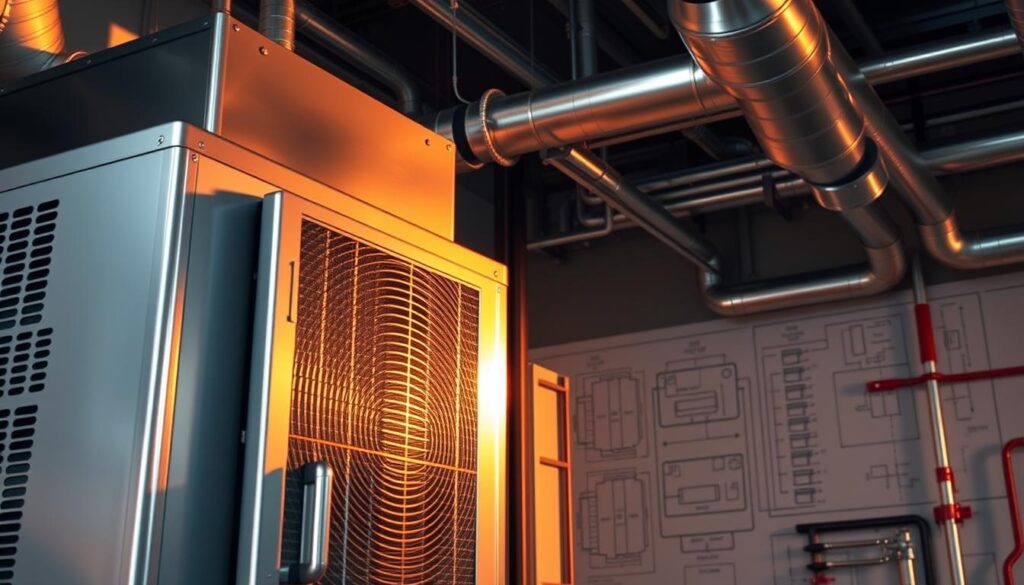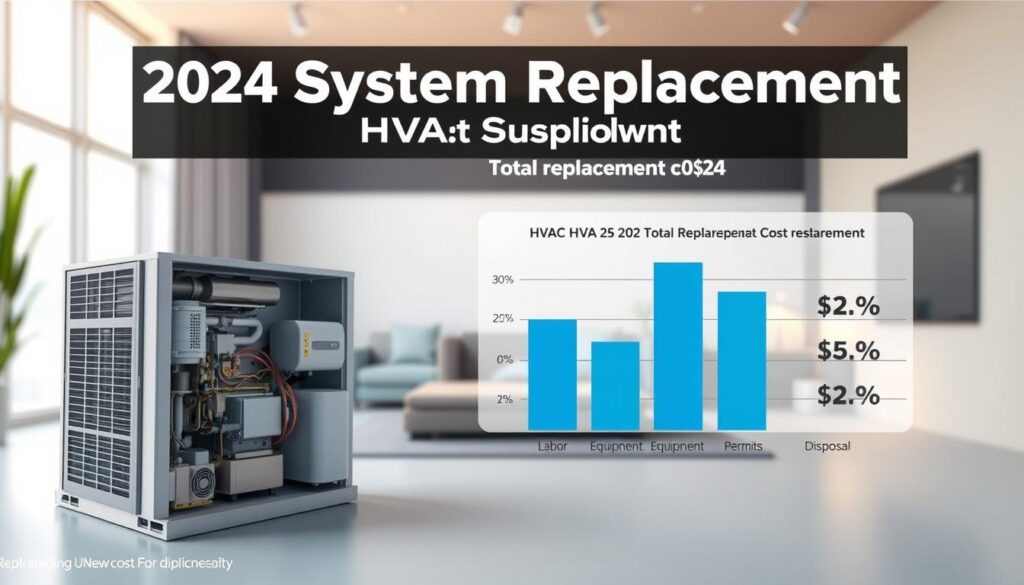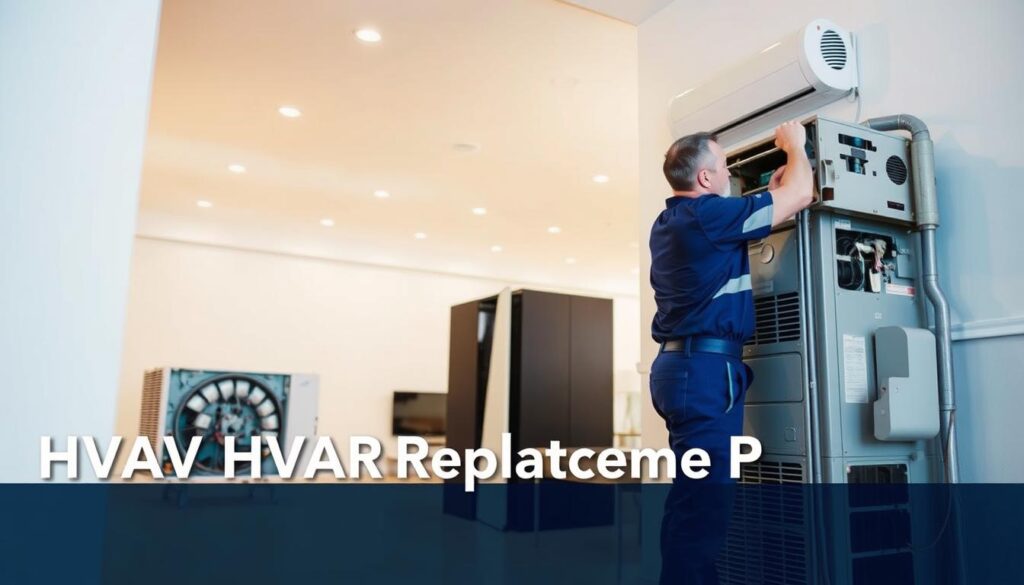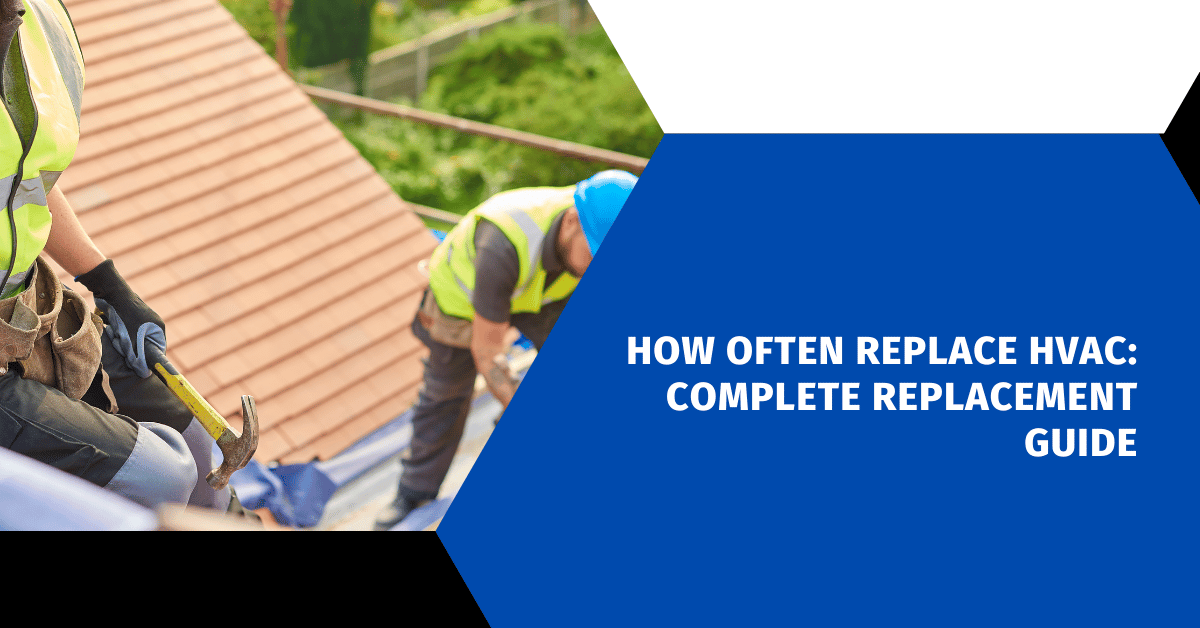Affiliate Disclosure
HVAC Guide Guys is a participant in the Amazon Services LLC Associates Program, an affiliate advertising program designed to provide a means for sites to earn advertising fees by advertising and linking to Amazon.
How Often Replace HVAC? Is your old HVAC system draining your wallet? Knowing when to replace it can save you thousands. It also prevents unexpected breakdowns.

Your HVAC system is a big investment. It affects your comfort, energy use, and monthly bills. The right time to replace it varies based on several factors.
ENERGY STAR suggests checking your HVAC system’s performance often. Signs like higher energy bills, uneven temperatures, and frequent repairs mean it might be time for a new one.
Key Takeaways
- HVAC systems typically last 10-15 years with proper maintenance
- Regular system inspections can prevent unexpected failures
- Energy efficiency improvements can offset replacement costs
- Modern HVAC units offer significant performance improvements
- Professional assessment helps determine optimal replacement timing
Table of Contents
Understanding HVAC System Lifespan and Replacement Cycles
Your HVAC system is key to your home’s comfort. Knowing how long it lasts helps you budget for future replacements. Each part of your system has a different lifespan, influenced by many factors.
Knowing how long your HVAC parts will last can save you money. It also helps avoid sudden breakdowns. ENERGY STAR offers guidelines for when to replace your system based on age and performance.
Average Lifespan of HVAC Components
- Air Conditioners: 10-15 years
- Heat Pumps: 10-15 years
- Furnaces: 15-20 years
- Boilers: 15-20 years
Factors Affecting System Longevity
To make your HVAC last longer, focus on these key areas:
- Regular maintenance
- Quality of initial installation
- Local climate conditions
- How often you use the system
- Keeping air quality and filters clean
Manufacturer Recommendations for Replacement
| HVAC Component | Recommended Replacement Age | Key Consideration |
|---|---|---|
| Air Conditioner | 10-15 years | Efficiency decline |
| Heat Pump | 10-15 years | Performance degradation |
| Furnace | 15-20 years | Energy efficiency |
Professional HVAC technicians suggest checking your system regularly. This can help you plan for replacements before they’re needed.
Explore Our HVAC Shop
Looking for top-rated HVAC tools, parts, and accessories? Visit our shop and find the perfect solution for your needs.
Visit the ShopKey Signs Your HVAC System Needs Replacement
Knowing when to replace your HVAC system can prevent sudden breakdowns and expensive repairs. A well-working heating and cooling system keeps your home comfortable and energy-efficient.
It’s important for homeowners to recognize when their HVAC system needs to be replaced. Several signs can indicate when it’s time to upgrade before it fails.
Performance and Efficiency Indicators
Your HVAC system may show it needs replacement through several performance issues:
- Uneven heating or cooling throughout your home
- Rooms that feel consistently uncomfortable
- Weak airflow from vents
- Frequent cycling on and off
Warning Signs of System Failure
Watch out for these critical warning signs that suggest your system might be nearing the end:
- Persistent strange noises during operation
- Visible rust or corrosion on system components
- Frequent repairs needed within short periods
- Age of system exceeding 10-15 years
Energy Bill Analysis
Your energy bills can give you important insights about your HVAC system’s efficiency:
| Bill Indicator | Potential HVAC Issue |
|---|---|
| Sudden spike in energy costs | Decreased system efficiency |
| Consistently high monthly bills | Aging or malfunctioning system |
| Increasing repair expenses | Potential need for full replacement |
Consumer Reports suggests replacing your HVAC system if repair costs are more than 50% of a new unit’s price. Being proactive can help you avoid unexpected failures and keep your home comfortable.
How Often Replace HVAC: Essential Timeline Guidelines
Knowing when to replace your HVAC is key to keeping your home comfy and energy-efficient. Most HVAC systems last a certain number of years. This helps homeowners plan when to replace theirs.
Different parts of your HVAC system last for different times. This can help you decide when to replace them:
- Air conditioners: 10-15 years
- Furnaces: 15-20 years
- Heat pumps: 10-15 years
- Boilers: 15-20 years
How long you’ll need to replace your HVAC depends on a few important things:
- Usage frequency: Systems in very hot or cold places need to be replaced sooner
- Maintenance history: Keeping your system well-maintained can make it last longer
- Installation quality: A professional installation can make your system last longer
- Technological advancements: Newer models are often more efficient
If your HVAC is getting close to 10-12 years old, it’s time to think about replacing it. Look out for signs like poor performance, higher energy bills, and frequent repairs. These are signs it might be time for a new one.
Replacing your HVAC on time can save you a lot of money on emergency repairs and energy costs.
Explore Our HVAC Shop
Looking for top-rated HVAC tools, parts, and accessories? Visit our shop and find the perfect solution for your needs.
Visit the ShopCost Analysis: HVAC Replacement vs. Repairs
Choosing between hvac maintenance and replacement is a big financial decision for homeowners. It affects your comfort, energy use, and budget over time. Knowing the costs of your HVAC system helps you decide wisely.
Getting a new hvac system might seem expensive at first. But, thinking ahead can save you money. HVAC pros suggest using the 5,000-rule to help make your choice.
Understanding the 5,000-Rule
The 5,000-rule is a simple yet effective tool for deciding between fixing or replacing your HVAC. Here’s how it works:
- Multiply the repair cost by your unit’s age in years
- Compare the result to $5,000
- If the number exceeds $5,000, replacement is recommended
- If below $5,000, repair might be the most cost-effective option
Long-term Cost Benefits
Getting a new HVAC system has big financial benefits:
| Cost Factor | Old System | New System |
|---|---|---|
| Energy Efficiency | Low (60-70%) | High (95-98%) |
| Annual Utility Costs | $1,200-$1,500 | $800-$1,000 |
| Maintenance Expenses | High | Low |
Energy Savings Considerations
Modern HVAC systems can cut energy use by up to 30%. This means big savings on your monthly bills and less harm to the environment.
By looking at repair costs, system age, and energy savings, you can make a smart choice. This choice balances short-term costs with long-term benefits.
Professional HVAC Assessment and Manual J Calculations
Finding the right HVAC system for your home is not a simple task. A professional HVAC assessment is key to maximizing your system’s lifespan and performance. These evaluations go beyond basic measurements. They give a detailed look at your home’s heating and cooling needs.
Manual J calculations are the top choice for sizing HVAC systems. This method looks at many important factors to ensure your system works well:
- Total square footage of your living space
- Number of floors and room configurations
- Insulation quality and building materials
- Window types and thermal performance
- Air leakage and ventilation characteristics
- Local climate and historical weather patterns
Experts use these calculations to suggest the best HVAC system for your home. They match your home’s needs to prevent common problems:
- Oversized systems that waste energy
- Undersized units struggling to maintain comfort
- Premature system wear and inefficient operation
Getting a professional assessment can save you thousands in repair and replacement costs. It ensures your comfort and energy efficiency.
Explore Our HVAC Shop
Looking for top-rated HVAC tools, parts, and accessories? Visit our shop and find the perfect solution for your needs.
Visit the ShopHVAC Replacement Cost Breakdown
Getting a new HVAC system is a big deal for homeowners. The cost can change a lot based on different things. Knowing these costs helps you plan your budget better and choose the right system for your home.

The cost of a new HVAC system depends on a few main things. The type of system and what your home needs can really affect the price.
Equipment Cost Ranges
Energy-efficient HVAC systems have different prices. Here’s a breakdown of what you might pay for the equipment:
- Central Air Conditioners: $2,500 – $7,500
- Heat Pumps: $4,000 – $10,000
- Furnace Systems: $2,000 – $6,500
- Ductless Mini-Split Systems: $3,000 – $8,500
Installation and Labor Expenses
Labor costs can be 30-50% of your total budget. Getting professionals to install it right ensures it works well and lasts longer.
| Installation Factor | Cost Range |
|---|---|
| Standard Installation | $1,500 – $3,500 |
| Complex Installation | $3,500 – $7,000 |
| Ductwork Modification | $1,000 – $5,000 |
Additional Cost Factors
There are more costs to consider beyond the basic equipment and installation:
- Home size and layout
- Existing ductwork condition
- Electrical system upgrades
- Local permit requirements
- Regional labor rates
Pro tip: Always get multiple quotes and think about long-term energy savings when choosing your HVAC replacement.
Energy Efficiency Upgrades and Modern HVAC Options
Thinking about upgrading your HVAC system? Modern tech brings exciting energy-saving options. These upgrades can make your home more comfortable and cut down on energy use. New HVAC technologies have changed how we control our home’s climate, bringing smarter and more efficient choices.
Here are some top energy-saving upgrades to look into:
- Variable-speed compressors that adjust cooling and heating precisely
- Smart thermostats with advanced learning capabilities
- Zoned heating and cooling systems
- High-efficiency heat pumps
ENERGY STAR qualified systems are the best for saving energy. These systems are 15% more efficient than old models for furnaces and 5% for boilers. Upgrading can lower your bills and help the planet.
There are also financial perks to consider. Utility companies and government programs offer rebates and tax credits for new systems. This can save you hundreds of dollars a year and make your home more cozy.
Investing in modern HVAC technology is investing in your home’s future comfort and efficiency.
Before you decide, talk to a pro HVAC tech. They can check your needs and suggest the best energy-saving options for your home.
Explore Our HVAC Shop
Looking for top-rated HVAC tools, parts, and accessories? Visit our shop and find the perfect solution for your needs.
Visit the ShopStep-by-Step HVAC Replacement Process Guide
Replacing your HVAC can seem daunting. But knowing when to replace it helps. A good plan makes the process smoother.

Before starting, there are key steps to take. They help reduce hassle and make your investment worth it.
Pre-Installation Preparations
- Schedule a home energy check
- Clear paths to where the new system will go
- Use drop cloths to protect floors and furniture
- Make sure your electrical system can handle the new system
- Get exact measurements for the new parts
Installation Day Procedures
On installation day, pros follow a set plan:
- They carefully take out the old system
- Check the ducts for any changes needed
- Put in the new parts
- Connect the electrical and refrigerant lines
- Set up the controls and settings
Post-Installation Verification
After it’s installed, expect a detailed test. Technicians will:
- Check the refrigerant levels
- Test how well it heats and cools
- Verify the electrical connections
- Show you how to use the system
- Give tips on maintenance
“A successful HVAC replacement is about precision, preparation, and professional expertise.” – HVAC Industry Expert
By following these steps, you’ll get a smooth HVAC replacement. It will make your home more comfortable and energy-efficient.
Conclusion
Knowing when to replace your HVAC system is key to a cozy home. You’ve learned about checking your system’s performance, age, and how well it works. Spotting when your HVAC needs a new one early can avoid sudden failures and keep your home comfortable.
Getting a pro to check your system is important for knowing when to upgrade. They’ll look at how efficient it is, repair costs, and how old it is. New HVAC tech can make your home warmer or cooler better and save you money on bills.
Keeping your HVAC in good shape is the best way to make it last longer. Regular checks, clean filters, and fixing small problems fast can save you money. When it’s time for a new one, do your homework and get expert advice for the best comfort and energy savings.
With this guide, you’re ready to make smart choices about your HVAC. Being proactive and making informed decisions will save you money and keep your home comfy for years.

